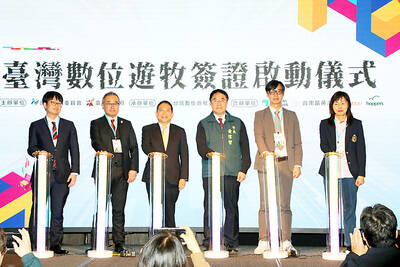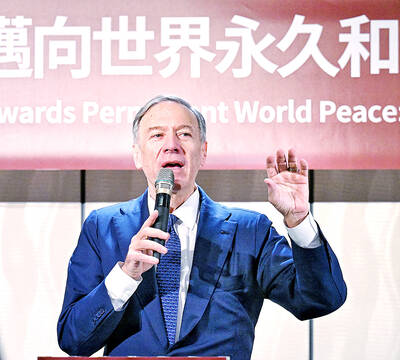Japan will raise military spending this year for the first time in more than a decade under a ruling party plan, an official said yesterday, as Tokyo summoned Beijing’s envoy in a territorial row.
The national defense task force of the newly elected Liberal Democratic Party (LDP) will raise the defense budget request by more than ¥100 billion (US$1.15 billion) in response to an emboldened China, a party official said.
The relatively small amount — a little more than 2 percent of the total military budget — is largely symbolic, but reflects anxiety at what Japan sees as an increasingly hostile region in which China appears happy to throw its weight around.
“We have decided that the additional budget will be used for research into a new radar system, as well as fuel and other maintenance costs for early-warning aircraft,” the official said on condition of anonymity.
The news came as the foreign ministry called in China’s ambassador to protest at the latest dispatch of official vessels into waters around the Tokyo-controlled Senkaku Islands, which Beijing claims as the Diaoyu Islands (世界華人保釣聯盟) and Taiwan claims as the Diaoyutais (釣魚台).
The ships entered the area around noon on Monday and left in the early hours of yesterday, officials said.
The summons was the first under Japanese Prime Minister Shinzo Abe, and is in line with the tough stance he pushed on China on the campaign trail last month.
However, Beijing rebuffed the move. Chinese Ministry of Foreign Affairs spokesman Hong Lei (洪磊) told reporters in Beijing patrols were “normal” because the islands are Chinese territory.
Nerves in Tokyo have also been rattled by an unpredictable North Korea. It sent a rocket over Japan’s southern islands last month in what it insisted was a satellite launch. Tokyo and its allies said the launch was a covert ballistic missile test.
In the run-up to last month’s election, the LDP pledged to expand the number of personnel in the Japanese Self-Defense Forces and boost their equipment and spending power.
The proposed increase in funding comes after declines over 10 consecutive years as Tokyo grappled with its huge public debt.
The initial defense budget for fiscal 2012, which ends in March, stood at ¥4.65 trillion. This compares with a budget for fiscal 2002 that peaked at ¥4.94 trillion.
Japanese Minister of Defense Itsunori Onodera has said Abe’s government will review Japan’s long-term basic defense program, adopted in 2010 under the Democratic Party of Japan, which was routed at the polls.
The current program includes plans to trim troop numbers by about 1,000.
Kyoto Sangyo University Institute for World Affairs director Kazuhiko Togo said the planned rise in defense spending was a direct result of China’s more hostile attitude, specifically over the disputed islands.
“China has publicly said it would seize the islands by force if necessary and acted as such. To avoid a possible armed clash, Japan has no choice but to possess deterrence by boosting its defense budget,” he said.
Meanwhile, Abe yesterday ordered Onodera to strengthen surveillance around the Senkakus, Kyodo news agency reported.
“I want you to respond firmly,” Kyodo quoted Abe as telling Onodera.
China’s State Oceanic Administration confirmed four Chinese marine surveillance ships were patrolling waters near the islands.
Additional reporting by Reuters

QUIET START: Nearly a week after applications opened, agencies did not announce or promote the program, nor did they explain how it differed from other visitor visas Taiwan has launched a six-month “digital nomad visitor visa” program for foreign nationals from its list of visa-exempt countries who meet financial eligibility criteria and provide proof of work contracts. To apply, foreign nationals must either provide proof that they have obtained a digital nomad visa issued by another country or demonstrate earnings based on age brackets, the Bureau of Consular Affairs said. Applicants aged 20 to 29 must show they earned an annual salary of at least US$20,000 or its equivalent in one of the past two years, while those aged 30 or older must provide proof they earned US$40,000 in

SERIOUS ALLEGATIONS: The suspects formed spy networks and paramilitary groups to kill government officials during a possible Chinese invasion, prosecutors said Prosecutors have indicted seven retired military officers, members of the Rehabilitation Alliance Party, for allegedly obtaining funds from China, and forming paramilitary groups and assassination squads in Taiwan to collaborate with Chinese troops in a possible war. The suspects contravened the National Security Act (國家安全法) by taking photos and drawing maps of key radar stations, missile installations and the American Institute in Taiwan’s headquarters in Taipei, prosecutors said. They allegedly prepared to collaborate with China during a possible invasion of Taiwan, prosecutors said. Retired military officer Chu Hung-i (屈宏義), 62, a Republic of China Army Academy graduate, went to China

AIR DEFENSE: The Norwegian missile system has proved highly effective in Ukraine in its war against Russia, and the US has recommended it for Taiwan, an expert said The Norwegian Advanced Surface-to-Air Missile Systems (NASAMS) Taiwan ordered from the US would be installed in strategically important positions in Taipei and New Taipei City to guard the region, the Ministry of National Defense said in statement yesterday. The air defense system would be deployed in Taipei’s Songshan District (松山) and New Taipei City’s Tamsui District (淡水), the ministry said, adding that the systems could be delivered as soon as the end of this year. The US Defense Security Cooperation Agency has previously said that three NASAMS would be sold to Taiwan. The weapons are part of the 17th US arms sale to

UNITY MESSAGE: Rather than focusing on what Trump said on the campaign trail about Taiwan, Taipei should be willing to engage with the US, Pompeo said Taiwan plays a key role in Washington’s model of deterrence against China, former US secretary of state Mike Pompeo said in a speech in Taipei yesterday. During US president-elect Donald Trump’s first term, “we had developed what we believe was a pretty effective model of deterrence against adversaries who wanted to undermine the set of rules and values that the people of Taiwan and the people of the US hold dear,” Pompeo said at a forum organized by the Formosa Republican Association. “Succeeding in continuing to build this model will not solely rest at the feet of president Trump and his team,